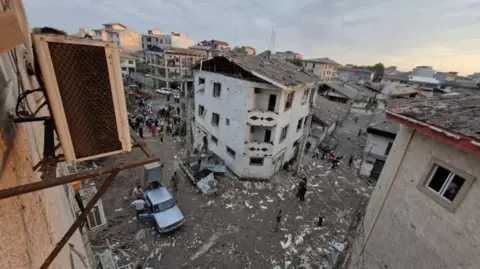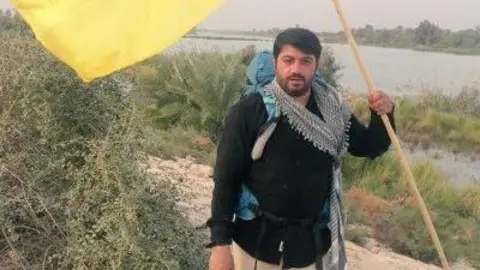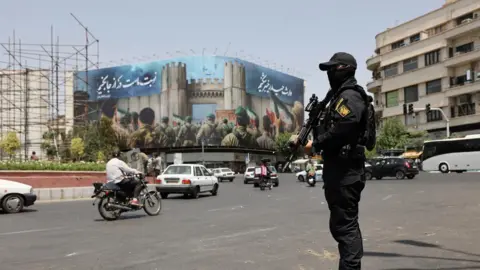Iran nuclear scientist killed in Israeli strike, state TV says
 BBC
BBCA senior nuclear scientist was among nine people killed in an overnight Israeli strike in northern Iran, Iranian officials and state TV have said, hours before a ceasefire ending 11 days of conflict took effect.
State TV cited sources who said the scientist, Mohammad Reza Seddiqi Saber, was killed at his parents' home in Astaneh-ye Ashrafiyeh, in Gilan province.
Gilan's deputy governor said four apartments were destroyed by an explosion in a residential building.
The Israeli government meanwhile said its military had "eliminated an additional senior nuclear scientist" in recent days, without identifying them.
That claim came in a statement that said Prime Minister Benjamin Netanyahu's security cabinet had agreed to US President Donald Trump's proposal for a ceasefire with Iran.
Iranian President Masoud Pezeshkian said his country would respect the ceasefire if Israel did.
Trump announced the ceasefire on Monday night and said at 05:00 GMT on Tuesday that it had taken effect, warning both sides not to violate it.
He later criticised both countries after Israel's military said it had shot down several incoming Iranian missiles and would carry out a new round of air strikes on Tehran in response.
Many Iranians who got in contact with BBC Persian said they doubted the ceasefire would last.
"[Iran and Israel] have, in a way, been forced into it at this point," one man said. "If they had the capacity to continue, without a doubt, this wouldn't have happened anytime soon."
Another man said: "I believe the whole war was orchestrated. Israel and the US came in and destroyed military and nuclear sites, Iran launched a few missiles... and both sides are satisfied. But ordinary people suffered the most."
A woman meanwhile said she feared that a "wounded, humiliated" Islamic Republic would now "turn its anger inward - towards the Iranian people".
On 13 June, Israel launched an air campaign against Iran, saying it aimed to remove what it called the "existential threats" of the country's nuclear and ballistic missile programmes.
Iran's health ministry has said that Israeli strikes have killed 610 people so far, although one human rights group has put the death toll at 974.
Iran has launched missiles at Israel in response, killing 28 people, Israeli authorities have said.
Residents of Tehran and other Iranian cities told BBC Persian that on Monday night they witnessed one of the "heaviest" rounds of strikes since the conflict started.
Israel's prime minister said its forces hit "regime targets" and killed "hundreds" of members of Iranian security forces and the paramilitary Basij Resistance Force.
Iranian Health Minister Mohammad Reza Zafarqandi said on Tuesday afternoon that Israeli attacks had killed 107 people and injured 1,300 over the past 24 hours.
Gilan's deputy governor general, Ali Bagheri, said nine people were killed and 33 injured in what he described as a "terrorist attack" on a residential building in Astaneh-ye Ashrafiyeh, according to Iranian media.
Sixteen women and children were among the casualties, he added, without identifying anyone.
Iranian government restrictions mean BBC journalists have not been able to report from inside Iran, so it is difficult to verify the reports.
However, night-time videos posted on social media showed a crowd of people walking over a rubble-strewn street towards a large fire. And in a daytime photo received by BBC Persian several damaged buildings and streets covered in debris were visible.
 Vahid Online/Telegram
Vahid Online/TelegramState TV later confirmed that Mohammad Reza Seddiqi Saber, 50, was among those killed.
It said he had been staying at his parents' house after his 17-year-old son was reportedly killed in an Israeli air strike on their home in Tehran several days ago.
Last month, the US imposed sanctions on Seddiqi Saber, saying he worked for Iran's Organisation of Defensive Innovation and Research (SPND) and headed a group that worked on explosives-related projects.
The US alleged that he was "linked to projects including research and testing applicable to the development of nuclear explosive devices".
At least nine other senior Iranian nuclear scientists have been assassinated by Israel since the start of the air campaign, according to the Israeli military.
The military claimed on 14 June that the men had "played a central part of the progress towards nuclear weapons" in Iran, without providing evidence.
Iran insists that its nuclear programme is entirely peaceful and that it has never sought to develop a nuclear weapon.
 WANA via Reuters
WANA via ReutersIn another development, Iran's judiciary confirmed that an Israeli air strike on Tehran's Evin prison on Monday had caused casualties.
Spokesman Asghar Jahangir did not say how many were killed or injured when part of the administrative building was destroyed. But he did say administrative and judicial staff, visiting civilians, family members of inmates and inmates themselves were among them.
Nobel Peace Prize-winning human rights defender Narges Mohammadi - who was temporarily released from Evin on health grounds last year - said on Monday night that the prison infirmary was also "destroyed", and that injured prisoners had no place to be treated.
Evin's thousands of prisoners include prominent political dissidents, human rights defenders, journalists, and dual and foreign nationals.
Iran's prison authority said it was carrying out transfers "to safeguard the rights of the prisoners and to provide space for emergency response teams".
Israel said it bombed Evin as part of a wave of strikes against "regime targets and agencies of government repression" in Tehran.
But the UN human rights office said Evin was not a military objective and that targeting it constituted "a grave breach of international humanitarian law".
Meanwhile in Israel, four people were killed when an Iranian missile struck an apartment building in the southern city of Beersheba on Tuesday, before the ceasefire took effect.
Israeli President Isaac Herzog said the attack was "outrageous and extremely painful".
